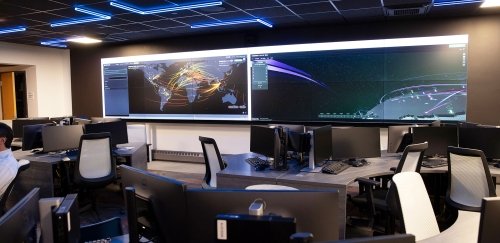
RIC is only the third higher education institution in the country using this technology.
The Institute for Cybersecurity & Emerging Technologies at Rhode Island College has just completed construction of a new cyber range on the first floor of Alger Hall in the School of Business.
Designed by LLB architects, this unique environment gives students simulated experiences of real-world cyberattacks and teaches them how to respond to them.
Four workstations fill the center of the room, with six computers per station. In total, the range accommodates 24 users.

A 24-foot-wide video wall spans the front of the classroom that can project images from multiple video sources, including the students’ PC screens so that they can share their content with the rest of the class.
The range environment runs on Cloud Range Cyber software, which offers 40 different cyber attack simulations, including malware, phishing and ransomware simulations. Three smaller video displays are mounted on the room’s other walls so that no matter where a student is sitting, they can see at least one screen for content.
The ceiling is equipped with microphones, speakers and color-changing LED lights to generate special effects. Faculty and staff run the simulations like the Wizard in Oz, pulling the levers, changing the lights and triggering the action.
“The whole point of these exercises is to create the stress-filled, pressured environment you’d feel when you’re defending your network against an attack,” says Doug Alexander, director of the Institute for Cybersecurity & Emerging Technologies. “During an attack, time is of the essence. You’ve got to get it right. And you’ve got to keep your cool.”

“To signify an attack is happening, lighting in the room might turn red,” he says. “Students will be asked to immediately respond as a team and to use the tools they’ve learned to investigate the attack. They’re asking themselves, ‘Where did the attack come from? How did the attackers get in? How do we get rid of them? How do we patch the environment? How do we close the holes? And how do we explain it all?’”
After successfully defending against an attack, the lighting turns green to signify that the network is safe once more.
Alexander notes that this is not only an environment for RIC students to train, it will be used by industry partners, as well, to train their teams.
“This is only the third IBM-powered academic cyber range in the country,” Alexander says. “That makes Rhode Island College a leader among the nation’s higher education institutions who are using this technology.”
And this is only phase one of the institute’s renovation plans. Phase two will be the renovation of Whipple Hall. Under a 2024 bond issue, Whipple Hall will undergo a $73 million renovation to become the permanent home for the Institute for Cybersecurity & Emerging Technologies. This facility will include more cyber range classrooms, state-of-the-art computer labs, a security operations center, faculty offices and collaborative workspaces. The renovation is expected to be completed by 2028.
Learn more about RIC’s B.S. in cybersecurity program and the Institute for Cybersecurity & Emerging Technologies.
